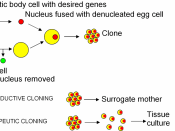PES Biology Human Awareness Essay: Human Cloning Background Human cloning is a highly publicised, groundbreaking topic. The effects of cloning and most importantly human cloning could change society and the biological world, as we know it. Bioethics, which is the study of value and judgments pertaining to human conduct in the area of biology, has been an important factor of all areas in the scientific field. One of the most recent bioethical issues facing society is the idea of human cloning. Cloning is best described as the genetic copying of an organism to create a 'replica' that has the same DNA. Han Spemann, a German embryologist, this attempt unfortunately failed, first attempted the process of cloning in 1938. It was not until 1970 when cloning of monkeys, pigs, frogs and sheep (Dolly) were successfully cloned. The major reason as to why humans have not yet been cloned is due to there being no certain procedure or 'ingredients' for a complete clone.(
Virginia, Sirs). If human cloning were to be socially, legally and scientifically possible, which it seems very close to being, then our society will under go many changes. As with most scientific breakthroughs, there are both positives and negatives. However, one effect is certain, each time a human clone is produced there is the element of risk and complicated legal issues.
Biological Relevance Human cloning has come closer and closer to being an effective and used biological tool. It is the cloning of sheep that gives us the best overview of how exactly cloning is done. The following diagram shows the process of cloning sheep.
In 1996 the first sheep was cloned in the Roslin Institute. The successful sheep was the 276th attempt at the tedious procedure. The procedure involved in human cloning, although not 100% refined, can...


